Today I'm going to talk about a topic that is somewhat unpleasant. It's a topic that may not be of interest to some of you younger folks, at least not yet. Even I delve into it with some reluctance.
But it's just too important not to mention. Because it might save someone's life.
Today I'm going to talk about my colonoscopy.
When I turned 50 - the age when a screening colonoscopy is recommended for most people - I was not in a hurry to get the exam that is among the most effective things we can do to prevent cancer mortality.
I should have been eager to have the test, because of my family history.
My aunt died from gastric cancer and my mother is currently being treated for it. Also, a close friend and colleague had colon cancer, but thankfully is now doing well.
Then there's the fact that I'm a doctor and should know better. Most preventive screenings - for GYN cancer, breast cancer, prostate, etc. - have become almost reflexive, like applying sunscreen or buckling your seatbelt.
Still, when it comes to getting that first colonoscopy, most people need a nudge. I got my nudge from our own Dr. Richard deShazo.
“Dr. Rick,” as he is known far and wide for the MPB radio program he founded, Southern Remedy, is the former chair of the Department of Medicine and the Billy S. Guyton Distinguished Professor of Medicine and Pediatrics. What I didn't know about Dr. Rick is he is BIG on prevention. He's a role model for all of us in health care.
So when I went to see Dr. Rick for an arthritic twinge in my hip and he learned that I'm 51 - BOOM - the next thing I knew I was scheduled for a colonoscopy. Along with an upper endoscopy - a screen of my esophagus, stomach and upper small intestine.
So I'll summarize the rest of the story. The colonoscopy prep that we all know about was not fun but basically we are talking about 24 hours of inconvenience for a potentially life saving test, so it's well worth it. The team in our GI Lab was wonderful and they made me as comfortable as possible. Although there was no cancer, there were findings on both exams that bear watching, all the more reason I'm glad I got this taken care of.
What is important in this story is not MY colonoscopy. It's that I can use it to bring attention to the fact that our state lags far behind the rest of the country in the percentage of people who are up to date with recommended colorectal cancer (CRC) screening guidelines, with estimates as low as 29 percent compliance. Worse yet, our state has the worst mortality rate in the nation for colorectal cancer, at 19.9 deaths per 100,000 population.
 We're working hard to turn this around. Recently I signed the pledge of the National Colorectal Cancer Roundtable, of which UMMC is a member, to strive to achieve 80 percent compliance with CRC screening guidelines by 2018.
We're working hard to turn this around. Recently I signed the pledge of the National Colorectal Cancer Roundtable, of which UMMC is a member, to strive to achieve 80 percent compliance with CRC screening guidelines by 2018.
This is a tall order. Many of our state's citizens have economic barriers to obtaining appropriate screening. I so appreciate Dr. Roy Duhe, UMMC professor of pharmacology and toxicology and radiation oncology, for his passion in leading our efforts to move the needle on these discouraging statistics.
One thing we can do is talk about it more. Encourage friends and loved ones who are eligible to be screened to go ahead and do so. Understand that colonoscopy screening, as was recently reported in a landmark study published in the Journal of the American Medical Association, saves precious lives and money.
We'll work on getting Mississippi's numbers up. But what I'd like to see is all of you at UMMC age 50 and older who haven't scheduled your first colonoscopy to go ahead and do so. Remember that CRC screening is a covered benefit for all our employees who participate in the State and School Employees' Health Insurance Plan.
Consider this VC Notes a friendly nudge from yours truly, on our way to A Healthier Mississippi.



